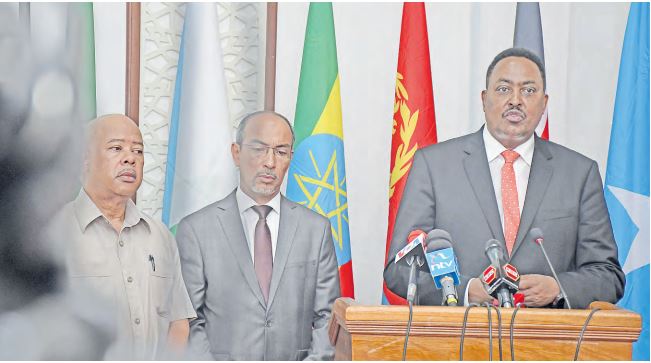
Terrorism, human trafficking, cybercrime and the illegal arms trade remain the most persistent security threats that face East Africa despite significant progress made to tackle them.
The Inter-Governmental Authority of Development on Tuesday said more efforts have to be made jointly by the member states to ensure security for all the over 300 million people at risk.
According to IGAD Executive Secretary Workneh Gebeyehu, the growing prevalence of organised has seen incidents rise by 30 per cent in recent years.
Similarly, the annual cyber-security report estimates that the global cybercrime economy is valued at $9.5 trillion a year or $793 billion a month in 2024.
“This is a stark reminder of what is at stake and highlights the scale of the challenges we must confront,” he said.
He spoke in Mombasa during the high level regional forum on the IGAD regional cooperation and coordination mechanism against transnational security threats statute and operationalisation.
The IGAD region covers 5.2 million square kilometres and includes the countries of Djibouti, Eritrea, Ethiopia, Kenya, Somalia, South Sudan, Sudan and Uganda.
Gebeyehu said the RCCM against TSTs is not just another mechanism but a commitment to working together to confront these threats head-on.
Building on the foundation laid by IGAD’s Security Sector Programme, this mechanism is designed to enable member states to share intelligence more effectively, harmonize their legal frameworks, and strengthen their capacity to respond to threats as a unified region.
“These are threats that have disrupted lives, weakened economies and tested the resilience of our nations,” he said.
Gebeyehu said significant strides have been made.
For example, IGAD’s conventions on Mutual Legal Assistance and Extradition, though awaiting broader ratification, have set the groundwork for legal coordination across borders.
The establishment of the IGAD Criminal Information System promises to revolutionise how intelligence is collected and shared, making responses faster and more effective.
Additionally, the capacity-building workshops held since 2014 have equipped over 2,000 of security professionals with the skills needed to tackle these complex challenges. However, the efforts are not without challenges.
“Key conventions remain to be ratified, and resource limitations continue to slow our progress. These challenges represent opportunities to strengthen our resolve and deepen our partnerships while building on multilateral approaches,” he noted.
IGAD’s collaboration with the European Union, which has provided
over 10 million euros through the
Africa Peace and Security Architecture, is a testament to what working
together can achieve, he said.












